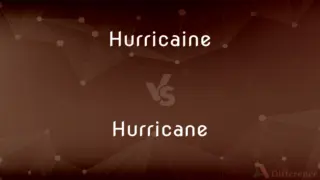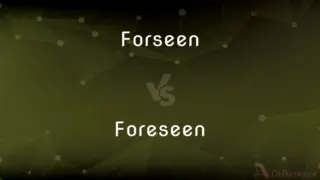Suspense vs. Suspence — Which is Correct Spelling?
By Tayyaba Rehman — Updated on March 19, 2024
"Suspense" is the correct spelling, referring to a state of anxious uncertainty or expectation. "Suspence" is an incorrect variant.

Table of Contents
Which is correct: Suspense or Suspence
How to spell Suspense?

Suspense
Correct Spelling

Suspence
Incorrect Spelling
ADVERTISEMENT
Key Differences
Remember the phrase: "In suspense, use the sense of 'se'."
Associate "suspense" with a tense movie scene.
Note that "spence" is unrelated to the meaning of anxious expectation.
Recall the related word "suspension," which also uses "se."
Think of "sense" - a word ending with "se" that is used to perceive tension or excitement.
ADVERTISEMENT
How Do You Spell Suspence Correctly?
Incorrect: The suspence in the story keeps readers engaged.
Correct: The suspense in the story keeps readers engaged.
Incorrect: I can't handle the suspence; I need to know the ending now.
Correct: I can't handle the suspense; I need to know the ending now.
Incorrect: She wrote a novel that masterfully builds suspence.
Correct: She wrote a novel that masterfully builds suspense.
Incorrect: The movie was filled with suspence from start to finish.
Correct: The movie was filled with suspense from start to finish.
Incorrect: Waiting for the test results was pure suspence.
Correct: Waiting for the test results was pure suspense.
Suspense Definitions
Suspense is a state of mental uncertainty, anxiety, being undecided, or being doubtful. In a dramatic work, suspense is the anticipation of the outcome of a plot or of the solution to an uncertainty, puzzle, or mystery, particularly as it affects a character for whom one has sympathy.
Suspense is a feeling of anxious uncertainty about what will happen next.
The movie's suspense kept me on the edge of my seat.
The condition of being suspended; cessation for a time.
Apprehension about what is going to happen
Anxiety or apprehension resulting from an uncertain, undecided, or mysterious situation
The suspense as they were announcing the winners was unbearable.
The quality in a work of narrative art, such as a novel or film, that causes the audience to experience pleasurable excitement and anticipation regarding an outcome.
(Archaic) The state or quality of being undecided, uncertain, or indecisive
The suspense of judgment.
The pleasurable emotion of anticipation and excitement regarding the outcome or climax of a book, film etc.
The unpleasant emotion of anxiety or apprehension in an uncertain situation.
(obsolete) Held or lifted up; held or prevented from proceeding.
(obsolete) Expressing, or proceeding from, suspense or doubt.
Held or lifted up; held or prevented from proceeding.
[The great light of day] suspense in heaven.
The state of being suspended; specifically, a state of uncertainty and expectation, with anxiety or apprehension; indetermination; indecision; as, the suspense of a person waiting for the verdict of a jury.
Ten days the prophet in suspense remained.
Upon the ticklish balance of suspense.
An uncertain cognitive state;
The matter remained in suspense for several years
Excited anticipation of an approaching climax;
The play kept the audience in suspense
Suspense refers to a quality in literature or film that evokes excitement or tension.
The author builds suspense throughout the novel.
Suspense denotes a state of being undecided or undetermined.
The decision was in suspense until the final vote.
Suspense can describe a temporary delay or deferment.
The game was held in suspense due to rain.
Suspense means an apprehensive anticipation.
The suspense of waiting for test results was agonizing.
(legal) A temporary cessation of one's right; suspension, as when the rent or other profits of land cease by unity of possession of land and rent.
A deadline.
Expressing, or proceeding from, suspense or doubt.
Cessation for a time; stop; pause.
A cool suspense from pleasure and from pain.
A temporary cessation of one's right; suspension, as when the rent or other profits of land cease by unity of possession of land and rent.
Suspense Meaning in a Sentence
Waiting in suspense, they hoped for good news.
The director knows how to create suspense to keep the audience engaged.
The suspense before the announcement was palpable.
The novel's suspense builds steadily towards a climactic finale.
He enjoys reading books full of mystery and suspense.
She held her breath in suspense as the protagonist opened the door.
The audience was on the edge of their seats, filled with suspense.
He crafted the story to maintain suspense until the very end.
The suspense of not knowing the outcome was the hardest part.
In suspense films, the anticipation of what will happen next is key.
The suspense surrounding the mystery was finally resolved in the last chapter.
The news report left viewers in suspense with the promise of more information.
The magician's act was filled with suspense, making the audience gasp.
The suspense of waiting for a response was almost too much to bear.
The book's blurb promised intrigue and suspense on every page.
The game ended in a suspense-filled overtime.
The entire room was in suspense as the jury returned with their verdict.
The suspense was broken by the sudden ringing of the phone.
The suspense of the competitive match had fans holding their breath.
The suspense in her voice told us that the news was not going to be good.
The writers know how to weave suspense into their stories effectively.
The suspense over the election results lasted for days.
Common Curiosities
What is the verb form of Suspense?
The verb form related to "suspense" is "suspend."
What is the root word of Suspense?
The root word is the Latin "suspendere."
Which vowel is used before Suspense?
Typically, "a" or "in" as in "a state of suspense" or "in suspense."
What is the plural form of Suspense?
Suspense is typically uncountable, but if referring to various types or instances, it's "suspenses."
What is the singular form of Suspense?
The singular form is "suspense."
Which preposition is used with Suspense?
Commonly, "in" as in "in suspense."
What is the pronunciation of Suspense?
The pronunciation is /səˈspens/.
Is Suspense a noun or adjective?
"Suspense" is a noun.
Is Suspense a negative or positive word?
Neutral, but often associated with tension or anxiety.
Why is it called Suspense?
It's called "suspense" because it stems from the Latin "suspendere," meaning to suspend or hang, evoking a sense of uncertainty or expectation.
Is Suspense an adverb?
No, it is not an adverb.
Is Suspense an abstract noun?
Yes, it represents an intangible concept.
Which conjunction is used with Suspense?
Any conjunction can be used depending on the sentence structure.
Is the Suspense term a metaphor?
Not inherently, but can be used metaphorically in writing.
Is the word Suspense a Gerund?
No, "suspending" would be the gerund form of the verb "suspend."
What part of speech is Suspense?
It is a noun.
What is the opposite of Suspense?
Certainty.
Which article is used with Suspense?
Either "a" or "the," depending on context.
How many syllables are in Suspense?
Two syllables.
What is another term for Suspense?
Anticipation.
Is Suspense a vowel or consonant?
"Suspense" is a word composed of both vowels and consonants.
Is Suspense a countable noun?
Typically uncountable, but can be countable in some contexts.
Is the word Suspense imperative?
No, it is not imperative.
What is a stressed syllable in Suspense?
The second syllable, "pense."
Is Suspense a collective noun?
No, it is not a collective noun.
How do we divide Suspense into syllables?
Sus-pense.
Which determiner is used with Suspense?
Determiners like "this," "that," "some," "any" can be used, depending on the context.
How is Suspense used in a sentence?
The suspense of the thriller novel made it impossible to put down.
Is the word “Suspense” a Direct object or an Indirect object?
It can be either, depending on the sentence structure.
Share Your Discovery

Previous Comparison
Capiche vs. Capisce
Next Comparison
Lens vs. LenseAuthor Spotlight
Written by
Tayyaba RehmanTayyaba Rehman is a distinguished writer, currently serving as a primary contributor to askdifference.com. As a researcher in semantics and etymology, Tayyaba's passion for the complexity of languages and their distinctions has found a perfect home on the platform. Tayyaba delves into the intricacies of language, distinguishing between commonly confused words and phrases, thereby providing clarity for readers worldwide.









































